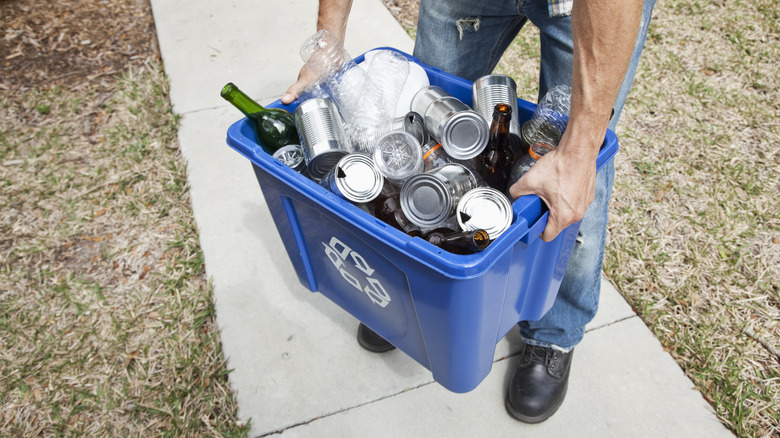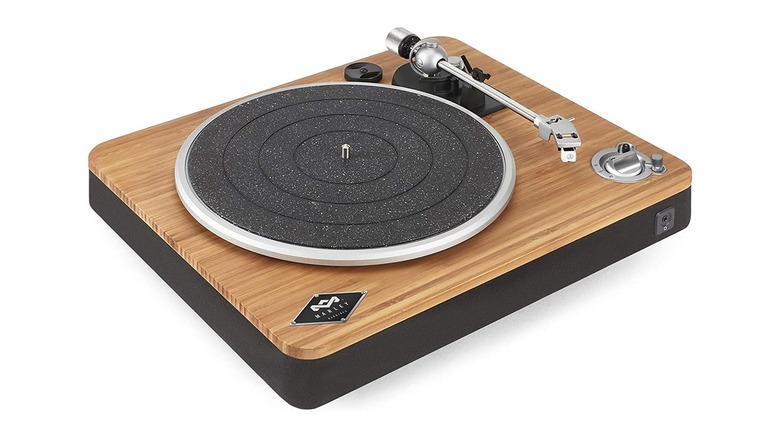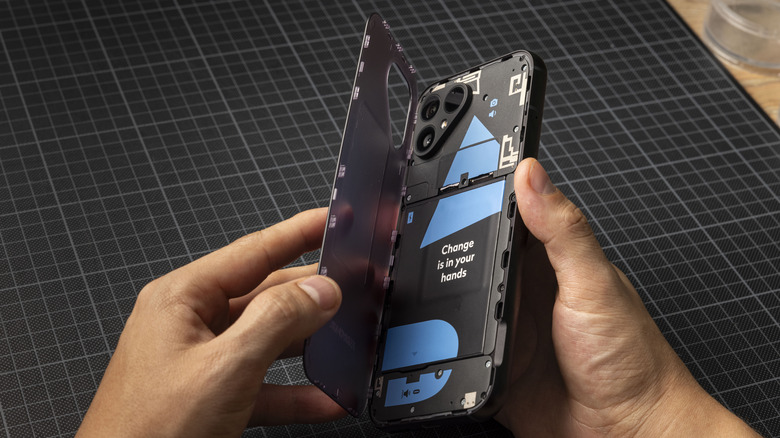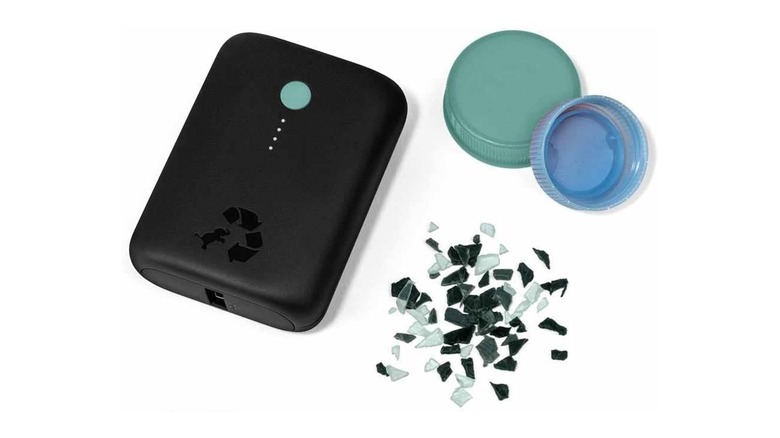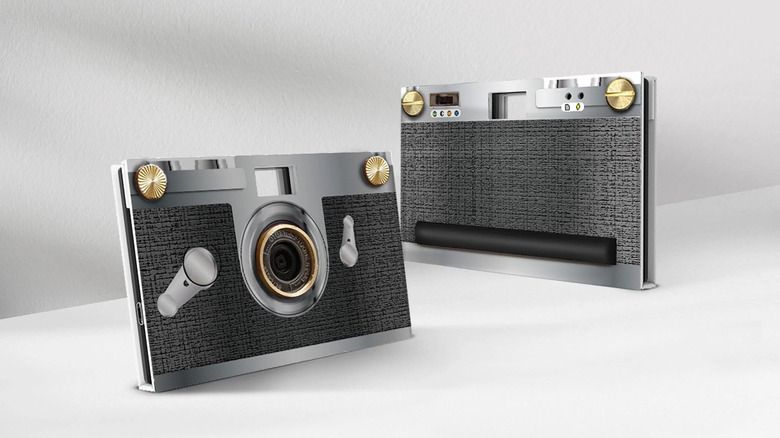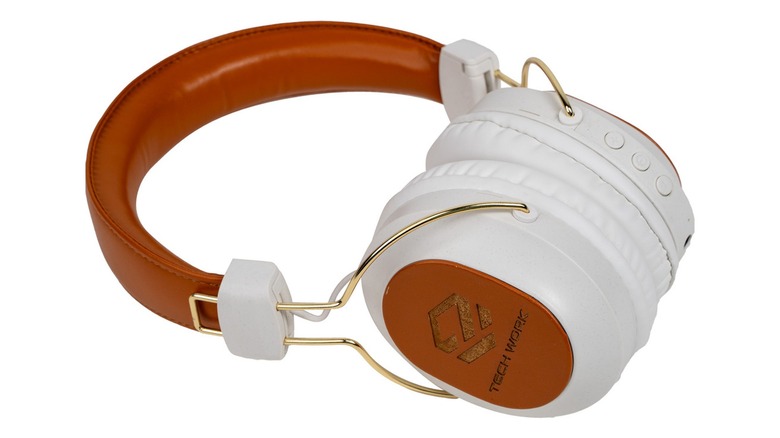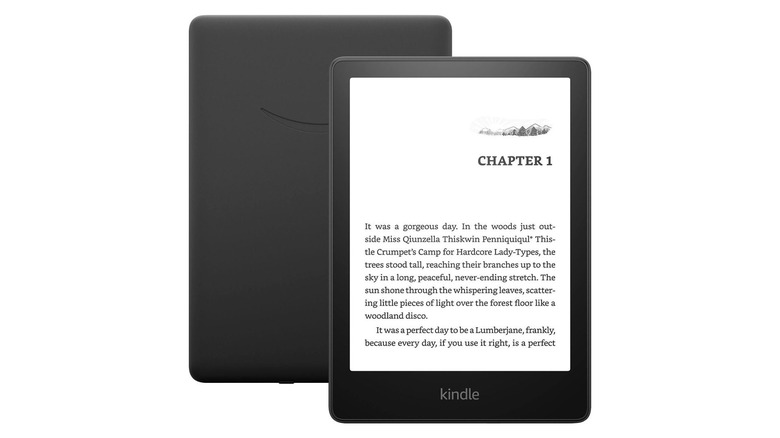6 Sustainable Tech Products Made Out Of Recycled Materials
We may receive a commission on purchases made from links.
If you're a Gen X-er or younger, you've probably been told all your life to recycle anything and everything recyclable. That includes cans, bottles, glass, paper products, and so on. It's easy enough to recycle the aforementioned materials, because your local trash collectors will gather all of those when you set them aside in clear bags or properly labeled bins.
However, when it comes to other potentially recyclable items, like old electronics, it gets more complicated, and usually requires you to bring your e-waste to specialized recycling plants. Trying to find electronic products that contain recycled materials can prove difficult as well, particularly when it comes to tech. This has become more and more of a concern in recent years thanks to the rare earth minerals required by many computers and computer-adjacent tech products, especially since they're often sourced under less than ethical circumstances.
This has resulted in a bigger push for more sustainable and fair trade tech products, both sourcing materials more ethically, and using recycled materials whenever possible. Though this is becoming more popular, it's not super-common just yet, so let's take a look at a range of tech products you can buy right now that include a significant amount of recycled materials.
House of Marley Stir It Up turntable
One company that's at the forefront of sustainable tech products is House of Marley, a "collaboration" with the family of reggae legend Bob Marley to continue his "legacy of love for music and planet." One of House of Marley's most eye-catching products is the Stir it Up, a turntable for playing vinyl records that's impressively feature-packed and sustainable for its $199.99 MSRP price tag — or $249.99 MSRP for the Bluetooth-enabled model.
For starters, it checks off some pretty important boxes for a $200 turntable: It includes a built-in pre-amp so, apart from speakers, you don't need any extra accessories to use it; a USB output for digitizing your vinyl; a 3.5mm aux out; a speed-adjustment switch; and a replaceable cartridge. That last one is particularly important because it allows for an upgrade path without having to buy a new turntable.
Sustainability-wise, the turntable's plinth is made from bamboo, and the other solid parts use recycled plastic and recyclable aluminum. Silicone is manufactured using post-process and post-consumer waste, while fabric is woven from recycled hemp and PET plastic, along with reclaimed cotton.
How does it sound? Pretty darned good according to professional reviews. In particular, Louder gave it four-and-a-half stars out of five, touting its "great sound for the price," while Digital Trends gave it the same score and an Editors' Choice recommendation, and praised its "warm, dynamic sound."
Fairphone smartphones
One sustainable option that's come up in the past here at SlashGear is the line of Android-based smartphones from Fairphone. As of this writing, the Fairphone 5 is the newest version available internationally, with a special U.S. version of the previous year's Fairphone 4 being the latest with full support for the wireless bands used by American carriers. The sustainability of the newer Fairphones comes in two different ways. One is that the phone has a modular design, allowing easy user replacement of defective parts, all of which Fairphone makes readily available. This makes it easier to extend the life of the phone, but Fairphone is also big on using recycled materials in its handsets.
In the promotional copy for the FairPhone 4, it's noted that the phone's body is made from aluminum sourced from vendors with Aluminium Stewardship Initiative certifications for sustainability, while the back cover is 100% recycled plastic. The copy for the FairPhone 5, meanwhile, notes that the newer handset includes a speaker containing "100% recycled rare earth elements and 90% recycled plastics for the speaker cover, as well as Fairtrade gold integrated in the supply chain." More broadly, the entire phone consists of 70% recycled or fair-focus materials. This includes solder paste made entirely out of recycled tin, a battery with 80% recycled steel and nickel alloy, and a battery frame that's 75% post-consumer recycled plastic.
You're unlikely to find a greener smartphone than the FairPhone 5, so it's too bad that it doesn't play nice with American carriers for now.
Nimble chargers and cables
Another tech brand that prides itself on using as much in the way of recycled materials as possible is Nimble, which specializes in mobile accessories like cases, chargers, and cables. On its website, Nimble has a materials page that breaks down everything that it uses. There's "REPLAY" certified post-consumer plastic and aluminum, recycled polycarbonate from CDs and DVDs, recycled PET from plastic bottles, recycled glass, recycled silicone, and recycled paper for packaging.
The pictured Champ Lite portable charger and power bank, for example, has a housing that consists of almost 75% post-consumer plastic, which Nimble claims will help "reduce total footprint by 7.43 lbs of CO2 compared to similar-sized portable chargers." Nimble's PowerKnit line of cables, meanwhile, like its USB Type-C cable, have cable jackets sourced entirely from recycled plastic bottles and recycled aluminum cable heads. Even Nimble's screen protectors get in on the action, consisting of 45% recycled glass.
On top of making accessories that extensively source recycled materials, Nimble offers prepaid shipping labels for recycling up to one pound of e-waste. All told, if you're looking for a green alternative to the usual mobile accessory brands, then Nimble looks like a great place to start.
Paper Shoot digital cameras
Point-and-shoot digital cameras have largely been supplanted by smartphones. This has been the case for a long time, but it's become especially true in the last several years, now that the manufacturers have figured out various tricks, like folded lenses, that allow for smartphones to have optical zoom capabilities. Although some phones had periscope lenses and optical zoom as far back as 2004, most didn't, giving dedicated cameras a distinct advantage over smartphones. Now? Not so much.
Paper Shoot is looking to reverse the point-and-shoot camera's fortunes, but not when it comes to core photography features. Instead, Paper Shoot's cameras prioritize sustainability, by way of using recycled materials. According to Paper Shoot's environmental impact page, everything in the cases of their cameras "is 100% vegan and recycled," with the camera board itself made "from recycled, repurposed, or biodegradable materials."
Paper Shoot says that the company's most popular unit, the Paper Camera, is made from what they're calling "Stone Paper," described as "pressed inorganic limestone that is water-resistant and drop-proof." The resin used to hold it together is biodegradable, too, meaning that, per Paper Shoot, the case will fully dissolve "after a year of constant exposure to the elements." Their other cases, meanwhile, are all made out of recycled materials, like wood and fiberglass, while the frames and screws are recycled brass, which Paper Shoot notes is "an infinitely recyclable material."
If you're looking for something different when it comes to digital photography, Paper Shoot looks like an interesting option.
HPG Origaudio TerraTone headphones and speakers
You've read enough about recycled wood, metal, paper, and fabric going into green tech products in this article that you probably expected green headphones and speakers at some point, so here they are. They come in the form of the TerraTone line from Origaudio, a brand owned by HPG Brands.
HPG offers up three pieces of audio hardware in the Origaudio Terratone line: over-ear wireless headphones, a pair of wireless earbuds, and a small Bluetooth speaker. All three are described by HPG as using recycled imitation leather and recycled plastic. HPG's website doesn't give much in the way of detail about the materials, though, with its "Compliance & Sustainability" page not mentioning recycled materials at all.
"Let's not sugarcoat things," said Alex Symms, HPG's director of sales for the West Coast brands, when quoted in an Advertising Specialty Institute article in February 2024. "There are electrical components in tech. You can't have a recycled PC board or speaker." Symms also told ASI that the products' white plastic shells were sourced from 80% recycled post-industrial waste, while the imitation leather came from 100% post-industrial polyurethane waste.
The TerraTone line was launched in February 2024, and there are no professional or even user reviews of these findable online as of this writing, so we don't have a good idea of how they sound.
Amazon Kindle e-readers
And now for something completely different — a venerable, wildly popular line of devices from one of the biggest tech companies in the world: Amazon's Kindle line of e-readers. Launched in 2007 as a singular product (as opposed to a whole line) with a physical keyboard (and not yet any kind of touchscreen), the Kindle has always been made to do one thing particularly well: display text, usually ebooks purchased from Amazon, on a sharp E-Ink display that manages to look somewhat like paper rather than a screen.
In time, the line expanded, with 2012's first-generation Kindle Paperwhite adding a defining feature that would eventually become standard across all Kindles. That would be a front light that made reading your Kindle comfortable — regardless of the lighting where you were reading.
And now? All of the current-generation Kindles contain a significant amount of recycled material. The $99.99 entry-level Kindle has 75% post-consumer recycled plastic in the standard black colored model (30% in the "Denim" version), and 90% recycled magnesium. The $149.99 Kindle Paperwhite sources 60% post-consumer recycled plastic and 70% recycled magnesium; the same goes for the $189.99 Paperwhite Signature Edition. And finally, the $339.99 Kindle Scribe, which Amazon describes as combining a Kindle and a notebook into a single device, includes 48% post-consumer plastic and 100% recycled aluminum.
As our own SlashGear reviews of the 2022 Kindle, the Kindle Paperwhite Signature Edition, and the multi-functional Kindle Scribe indicate, these are all excellent products that excel at doing what they're built to do. And now they're safer for the environment than they've ever been before.
